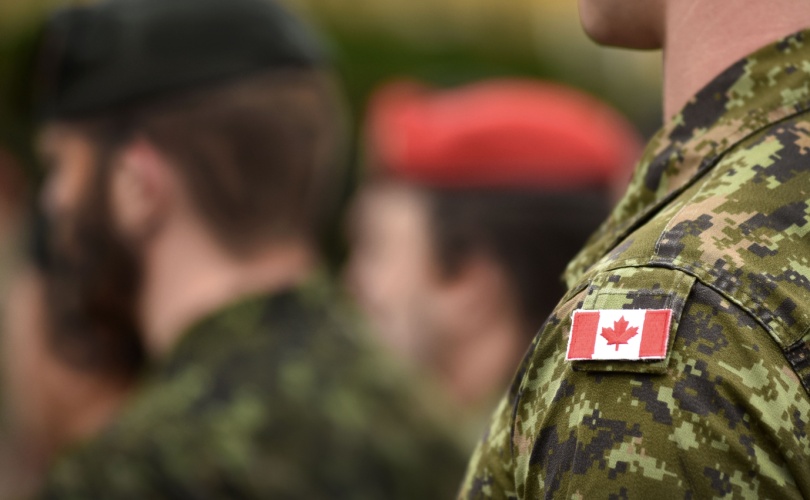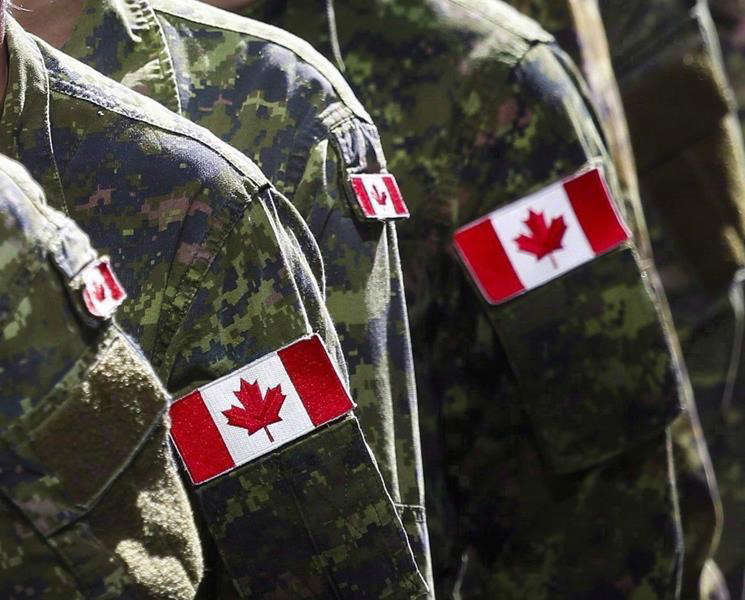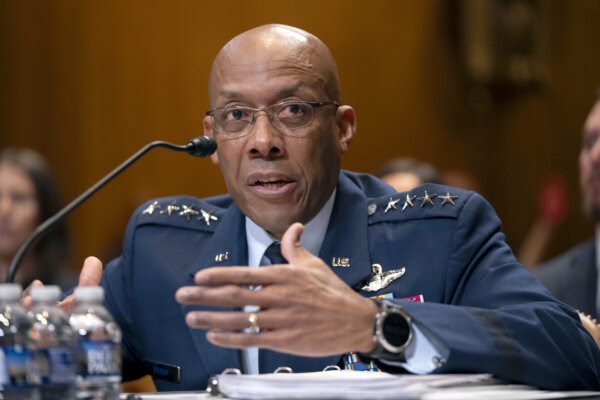armed forces
Major personnel losses force Canadian military to consider ending COVID vaccine mandate

From LifeSiteNews
Defence Minister Bill Blair called for ‘outdated medical requirements’ to be abolished as the Canadian Armed Forces have lost more members than it has gained since vax mandates were enforced in 2021.
The Canadian Armed Forces (CAF) may drop its vaccine mandate after losing more personnel than it gained since COVID-19 outbreak.
At the annual Ottawa Conference on Security and Defence on March 7, Defence Minister Bill Blair called for “outdated medical requirements” to be abolished as the CAF has lost more members than it has gained since COVID vaccine mandates were enforced in 2021.
“I really see no point in us spending a lot of time trying to find out how we got to this state,” Blair addressed the conference. “We must focus on what needs to be done, and we must get to work.”
“Because the bottom line is the Canadian Armed Forces must grow,” he declared, revealing that the CAF is short nearly 16,000 people in both regular forces and reserves.
“We must change the way in which we recruit and retain the people of our forces,” he declared.
“And therefore, I’ve asked our military leaders to take a hard look at expanding eligibility for recruitment, to abolish outdated medical requirements where they are not meaningful and relevant,” Blair said, perhaps alluding to COVID vaccine mandates.
Indeed, the CAF has seen a drastic decline in numbers since COVID vaccines were mandated in 2021. According to information obtained last month by Blacklock’s Reporter, only 12,793 Canadians have joined the CAF in the past three years and 15,176 were released.
Beginning in November 2021, the Liberal government under the leadership of Prime Minister Justin Trudeau mandated that 275,983 employees from the Royal Canadian Mounted Police, military and main federal departments provide proof of vaccination.
Those who failed to do so risked dismissal or suspension without pay. While there were provisions for medical and religious exemptions, these were rarely granted.
Currently, CAF members are “strongly encouraged” to take the experimental shot, but it is no longer a requirement for most personnel.
However, the vaccine is mandated for members supporting “operational readiness,” including members assigned “to units/elements expected to perform core functions/critical capabilities with short notice-to-move, such as SOF High Readiness Forces/Task Forces, (Standby) Ready-Duty Ships, DART, NEO, and contributions to NATO, the UN, or other partners.”
The shots are also required for members “placed on less than 45 days-notice-to-move with a potential to be deployed at a location with limited/no access to medical care, or locations or nations where vaccination is a prerequisite for entry/operations.”
Additionally, in November, Blair revealed that more soldiers are leaving CAF than can be replaced by recruits, a trend that started after COVID vaccines were mandated for all military members.
Also in November, a CAF member who spoke to LifeSiteNews under the condition of anonymity revealed that there is no “one root cause” for the army’s decreasing numbers but rather a number of factors that have caused military members to lose trust. He added that COVID vaccine mandates were likely the tipping point that put soldiers over the edge.
He explained that the military lost hundreds of soldiers for “no good reason” over COVID vaccine mandates. The military member further revealed that the military had no deaths from COVID despite working at the front lines in nursing homes.
“And when you think of those hundreds and hundreds of people, you have to think in the corporate knowledge we lost, the trainers, the institutional knowledge, the corporate knowledge,” the source lamented. “We’re talking about hundreds and hundreds of years of collective corporate knowledge has gone in months.”
He further explained that the military “rewrote the rulebook” when it came to COVID vaccines, allowing for very few religious exemptions and forcing the vaccine on all members.
He revealed that while army veterans have “given 20 years of their lives to the military,” “served in combat,” and have “a chest for medals,” the Canadians military considers them “a piece of garbage overnight because you refuse it (COVID vaccine).”
According to the military member, another reason for many leaving the military is “radical agendas that are being pushed left, right and center.”
“And it’s not stopping with the gender ideology, it’s going to include medical assistance in dying,” he added. “There’s something fundamentally changing. And for most people, it doesn’t sit well with them.”
He explained that the new ideologies are driving away new recruits. The primary source of recruitment for the military is Saskatchewan farm boys who want to serve Canada and not radical ideologies.
“That farm boy looks at the army and with the blue hair and the face, piercings and ideologies and all that stuff,” he said. “And it doesn’t have the same pull because it doesn’t represent the farm boy’s values.”
“This is not the Canada that we signed up to defend. It’s an alien ideology that people don’t resonate with,” he continued. “These are not Canadian values of freedom and democracy. These are cancel-culture values of censorship, of authoritarianism, of radical ideologies that are alien to our culture.”
armed forces
Canada’s Military is Collapsing. Without Urgent Action, We Won’t Be Able To Defend Ourselves

From the Frontier Centre for Public Policy
By David Leis
Decades of underfunding and political neglect have left our military weak and unprepared
What Lt.-Gen (retired) Michel Maisonneuve (ret.) told me about Canada’s military was nothing short of alarming. He didn’t mince words—our armed forces are in dire straits. If we don’t act now, Canada will not only be unable to defend itself, but it will cease to be taken seriously by our allies, many of whom are already losing patience with our military decline.
Maisonneuve has seen firsthand what a functioning military looks like. He has served at the highest levels, working alongside our allies in NATO, and he knows exactly what Canada is failing to do. “We are no longer at the table when major defence decisions are made,” he told me. “The Americans don’t ask us what we think anymore because they know we can’t contribute.” That is a stunning indictment of where we now stand—a country that was once respected for its ability to punch above its weight militarily has been reduced to an afterthought.
The problem, as Maisonneuve laid out, is both simple and staggering: Canada doesn’t take its defence seriously anymore. The government has allowed our forces to wither. The Air Force is still buying CF-18s from the 1980s because the long-delayed F-35 procurement is years behind schedule. The Navy, once a competent maritime force, is barely functional, with no operational submarines and a fleet that is nowhere near what is needed to patrol our vast coastlines.
Meanwhile, the Army is struggling to recruit and retain soldiers, leaving its numbers dangerously low. “We have an Army in name only,” Maisonneuve said. “If we were called upon tomorrow to deploy a fully operational combat force, we couldn’t do it.”
Even more shocking is the state of readiness of our troops. A recent report found that 75 per cent of Canadian military personnel are overweight. Maisonneuve didn’t sugarcoat it:
“It’s unacceptable. We are supposed to be training warriors, not watching fitness standards collapse.” When the people entrusted with defending our country are struggling with basic physical fitness, it speaks to something much deeper—an institutional rot that has infected the entire system. Our allies have noticed. Canada was locked out of AUKUS, the military alliance between the U.S., the U.K. and Australia. “It wasn’t an oversight,” Maisonneuve explained. “It was a deliberate snub. The Americans don’t see us as a serious defence partner anymore.” That snub should have been a wake-up call. Instead, our government shrugged it off.
Meanwhile, Washington is openly questioning Canada’s value in NATO. The Americans see the numbers—Canada refuses to meet even the minimum defence spending requirement of two per cent of GDP. Instead of fulfilling our obligations, we offer up empty promises and expect others to pick up the slack.
Maisonneuve is blunt about what needs to be done. “First, we need to fully fund the military—and that means not just hitting the NATO target but exceeding it. Our allies spend real money on their defence because they understand that security is not optional.” He suggests Canada should aim for at least 2.5 per cent of GDP, not just as a show of commitment but as a necessity to rebuild our capabilities. Beyond money, Maisonneuve argues that military culture must be restored.
“We’ve allowed ideology to creep into the ranks. The military’s primary function is to defend the nation, not to serve as a social experiment,” he said. “We need to get back to training warriors, not worrying about whether we’re ticking the right diversity boxes.” He believes a return to a warrior ethos is essential— without it, the military will remain directionless.
Procurement is another disaster that Maisonneuve insists must be fixed immediately. “We’ve spent years dithering on replacing equipment, and every delay puts us further behind,” he said. The F-35 deal should have been signed years ago, but political hesitation means we won’t see a full fleet for years. The Navy urgently needs new submarines and icebreakers, especially to secure the Arctic, where other global powers, particularly Russia, are ramping up their presence.
The biggest issue, though, is manpower. “We need to rebuild the forces, period,” Maisonneuve told me. “That means recruiting, training, and retaining soldiers, and we are failing at all three.” He even suggested that Canada should consider implementing a national service requirement, a move that would not only increase troop numbers but also instill a sense of duty and responsibility in younger generations. “We used to be a country that took security seriously,” he said. “What happened?”
That’s the question, isn’t it? What happened to Canada? How did we go from being a country that contributed meaningfully to global security to one that can’t even defend itself? The reality is that successive governments have let this happen—first by neglecting funding, then by letting bureaucracy suffocate procurement, and finally by allowing the core purpose of the military to be diluted.
Maisonneuve is clear: Canada must act now, or it will cease to be taken seriously.
David Leis is President and CEO of the Frontier Centre for Public Policy and host of the Leaders on the Frontier podcast
armed forces
Trump fires chairman of Joint Chiefs of Staff, appoints new military leader


From the Daily Caller News Foundation
By Mariane Angela
President Donald Trump announced Friday the dismissal of General Charles Brown, the current Chairman of the Joint Chiefs of Staff.
In a post on Truth Social, Trump expressed his gratitude toward Brown for his extensive contributions and leadership, wishing him and his family a prosperous future. Brown’s departure marks a pivotal moment in U.S. military leadership following over 40 years of service.
“I want to thank General Charles “CQ” Brown for his over 40 years of service to our country, including as our current Chairman of the Joint Chiefs of Staff. He is a fine gentleman and an outstanding leader, and I wish a great future for him and his family,” Trump wrote.
Simultaneously, Trump introduced his nominee for Brown’s successor.
“Today, I am honored to announce that I am nominating Air Force Lieutenant General Dan “Razin” Caine to be the next Chairman of the Joint Chiefs of Staff. General Caine is an accomplished pilot, national security expert, successful entrepreneur, and a “warfighter” with significant interagency and special operations experience,” Trump said.
Trump said Caine’s appointment comes after he was overlooked for advancement during former President Joe Biden’s presidency.
“General Caine was passed over for promotion by Sleepy Joe Biden. But not anymore! Alongside Secretary Pete Hegseth, General Caine and our military will restore peace through strength, put America First, and rebuild our military,” Trump said. President Trump also announced plans to appoint five additional senior military officials, tasks he has delegated to Secretary Hegseth.
It was reported Thursday that Hegseth plans to dismiss Brown as part of President Trump’s commitment to eliminate “wokeness” from the military. Brown reportedly appears on a list of proposed removals submitted to Congress.
Brown had previously expressed his wish to retain his position even after Trump took office, and according to sources speaking to NBC News in Dec. 2024, Trump seemingly moderated his views on the general. Biden nominated Brown as chairman in 2023, and despite a heated confirmation hearing where senators scrutinized his alleged implementation of racial quotas in Air Force hiring practices, he was confirmed.
Meanwhile, Brown’s replacement, Caine, took office as the associate director for Military Affairs at the CIA on Nov. 3, 2021, after serving as the director of Special Programs at the Pentagon. Lt. Gen. Dan Caine, an F-16 pilot with extensive experience including over 150 combat hours, was commissioned in 1990 and has held numerous key roles, from the White House staff to special operations, and balances his military career with entrepreneurial ventures.
-

 Catherine Herridge2 days ago
Catherine Herridge2 days agoFBI imposed Hunter Biden laptop ‘gag order’ after employee accidentally confirmed authenticity: report
-

 International2 days ago
International2 days agoTrump’s ‘Golden Dome’ defense shield must be built now, Lt. Gen. warns
-

 2025 Federal Election2 days ago
2025 Federal Election2 days agoDon’t let the Liberals fool you on electric cars
-

 Crime2 days ago
Crime2 days agoFirst Good Battlefield News From Trump’s Global War on Fentanyl
-

 Courageous Discourse1 day ago
Courageous Discourse1 day agoEurope Had 127,350 Cases of Measles in 2024
-

 2025 Federal Election2 days ago
2025 Federal Election2 days agoLiberals Replace Candidate Embroiled in Election Interference Scandal with Board Member of School Flagged in Canada’s Election Interference Inquiry
-

 espionage2 days ago
espionage2 days agoU.S. Experts Warn Canada Is Losing the Fight Against PRC Criminal Networks—Washington Has Run Out of Patience
-

 2025 Federal Election1 day ago
2025 Federal Election1 day agoPierre Poilievre Declares War on Red Tape and Liberal Decay in Osoyoos






